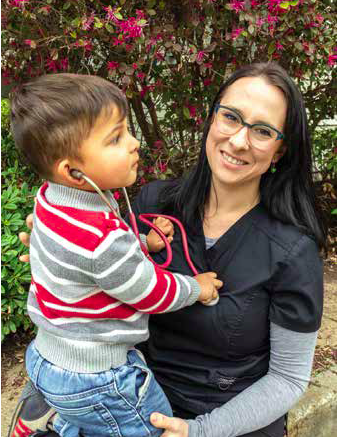There are many unsung heroes in these COVID-19 times, especially frontline healthcare workers. In Curtis Park, we have doctors, nurses, speech and physical therapists, pharmacists and other medical providers who put in long, stress-filled shifts while also trying to juggle work-life balance.
Lydia Marque, a registered nurse in the neurology and stroke department of a local medical center, has been dealing with COVID patients since February 2020, working three shifts a week, often with additional overtime hours.
Lydia lives on Portola Way with her husband, Allen, and their children, Devin, 4, and Dylan, 2. Allen owns Creative Web Systems, a web design, development and marketing company.
“I work in a neurology/stroke unit which has a unique relationship with COVID patients,” Lydia says. “We don’t see as many COVID patients as other units, but COVID doesn’t discriminate.”
Lydia says one of the biggest challenges for medical workers is witnessing so much fear and suffering in patients and in their families.
“Because of the need to keep patients, staff and visitors safe, there is a limited visiting policy,” she says. “For most people, being hospitalized is scary and likely one of the worst times of their lives. And then to have to adapt without their family and support members adds a new layer.”
The staff helps patients and families connect through iPads and video calls. “These are my favorite, and heart-tugging, moments when I see my patients connect with their families,” she says. “Seeing them try their hardest to show their children or spouse a thumbs up with a hand that’s been flaccid for weeks is such a miracle to witness.” She feels the stress of working long hours and extra shifts due to unpredicted surges in patient levels.
“The need for healthcare workers exceeds the supply at times, and we have had to work with what we have. Most of my colleagues and I have worked extra hours or double shifts to try to help fill gaps.”
Lydia tries to find a work-life balance with the demands of motherhood and family life competing with her job.

“I love what I do and feel a lot of reward in my career,” she says. “But I also have two little guys and an amazing husband who I miss all the time. I want to cherish these sweet, and sometimes challenging, moments at home. The most valuable lesson I’ve learned during this pandemic is to carve out some time for self-care, which I found is essential in being able to give back to both my family and my job.”
She wishes the general population would understand the immense physical and psychological stress healthcare workers are under on a daily basis.
“I think there’s going to be an element of mental trauma after this is over for healthcare workers as well as society in the whole,” she says. “There are days I go into work and I feel like I’m at war. In many ways, we as a society, are at war with COVID-19.”
She is a witness to the consequences of some unfortunate personal decisions.
“What I find challenging is when things, such as mask wearing, elevates politics over science and public health,” she says. “I respect people’s choice and right not to get vaccinated. But I find it challenging when the source of some statements fueling those concerns are not based in science. We all choose to live in a society where we need each other. The challenge with the virus is that there are so many variables, so much is unknown, and so much that we are still learning.”